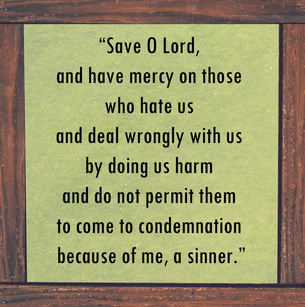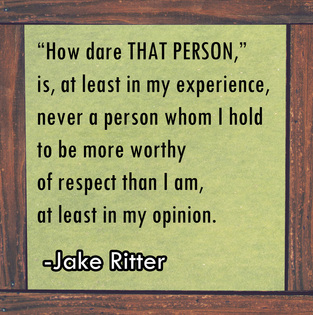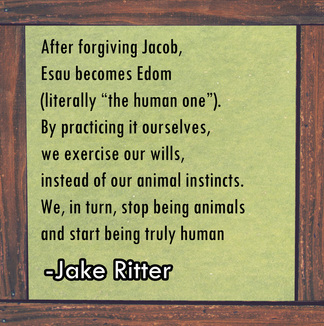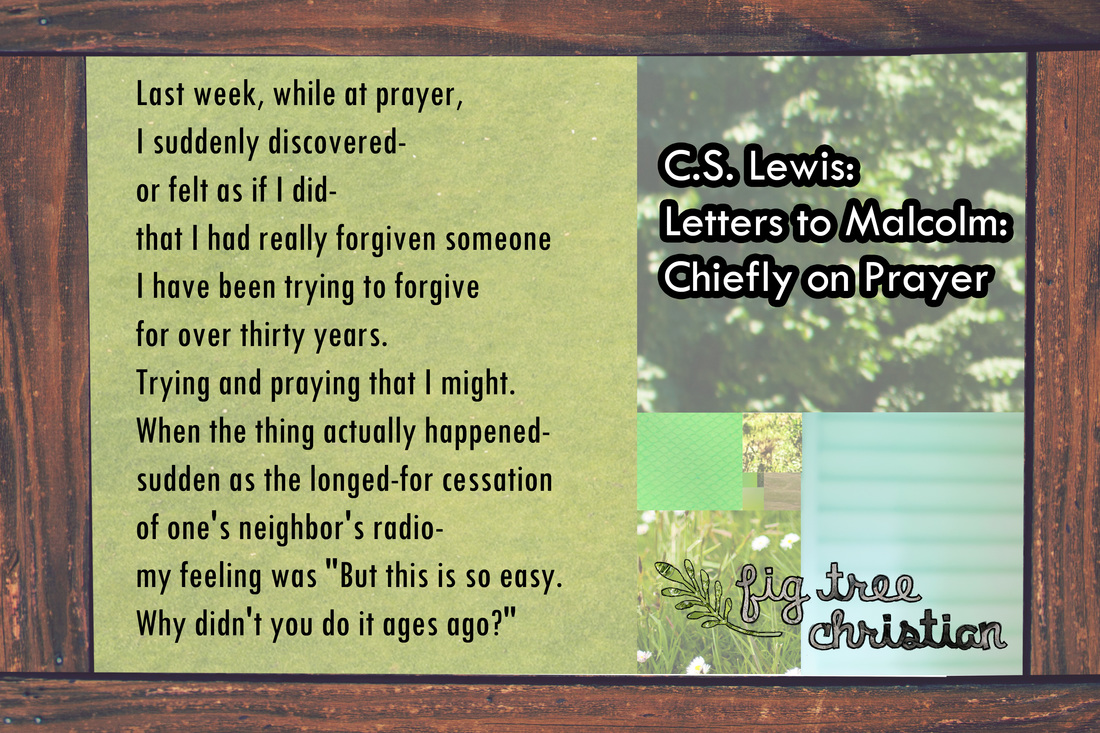|
“Jacob looked up and there was Esau, coming with his four hundred men; so he divided the children among Leah, Rachel and the two female servants. 2 He put the female servants and their children in front, Leah and her children next, and Rachel and Joseph in the rear. 3 He himself went on ahead and bowed down to the ground seven times as he approached his brother. 4 But Esau ran to meet Jacob and embraced him; he threw his arms around his neck and kissed him. And they wept.” Genesis 33:1-4 -Jake Ritter- As a man named after the Prophet Jacob, I’ve always been tempted to read this from his perspective, but this particular passage isn’t really about Jacob; it’s about Esau. Esau (literally “the hairy”) was the first born of Rebekah’s twin sons, and therefore the rightful heir to Isaac’s birthright: the physical land of Israel and the heavenly Covenant with God. Partly out of knowing that he had a birthright to fall back on, partly because of his own inclinations, he turned to a comparatively risky profession of hunting, as opposed to Jacob (literally “the usurper”), who took up shepherding. Hunting, then as now, was a seasonal profession, and there are times when there simply is no game to hunt. Jacob, as we all know, capitalized on just such a time in order to get consent to steal Esau’s birthright, the only security, earthly or otherwise, he could rely on, and then went on to trick their father into passing it to him. And what do men do, now as in any other time throughout human history, when they have nothing to lose and their only skills are sneaking up on things and killing them? Esau became a bandit, and later a warlord, settling the land of Edom and his descendants following in his footsteps making war on everyone around them, including Israel.  So when we see Esau “coming with his four hundred men,” this is why. He always had his 400 men, because his new life, which Jacob put him in, required it. But here is where the story turns: Esau was faced with the very real possibility of simply killing Jacob, taking back his birthright, and returning to his rightful place as Isaac’s heir, becoming the master of both worlds in the process. This is literally the same plot as the Lion King: the hero is betrayed and exiled in a moment of weakness, learns a new way of life in the outside world, and returns with his new skills to take back what is rightfully his. If we anticipated violence out of Simba and thought of it as righteous, we expect it also of Esau. But herein lies the lesson that God teaches us through Esau: letting go of the wrongs of the past is the way to follow God. Just as the father of the prodigal son ran to meet him, Esau did not hesitate or deliberate before meeting Jacob, “But Esau ran to meet Jacob and embraced him; he threw his arms around his neck and kissed him.” I dare say he might have even put a ring on his finger and killed a fatted calf, if he’d had them, but it seems Esau was still at least financially recovering, even then, from the loss Jacob had dealt him. To us as readers, this doesn’t meet our expectations. Surely Esau deserves redemption, he deserves restitution, he deserves his revenge and the rightful return to his previous place of honor after being wronged by Jacob. This is why, to our ears, it is easier for us to focus on Jacob serendipitously making amends with his brother, who is given no second thought. It fits better with our ideas of human justice. We all want to be Jacob in this situation, but if we are honest in our moral self-examination, we are Esau. We are the ones who are arrogant and impulsive, who are wronged in life in one way or another, and are given ample opportunities to hold grudges, to seek revenge, and dress it up in moralistic language by calling it redemption. In our culture the very meaning of forgiveness is warped into a lie we tell ourselves and others, acting as though the sin committed against us never happened, or that it didn’t actually hurt, or that we have fully recovered in order to continue existing amicably with everyone except the person we hold a grudge against. It is a shrunken, impoverished idea of what forgiveness means compared to the Christian ideal. The Christian sense of the word is finding it in ourselves to wish for God’s salvation to be extended to that person. As is in the morning prayers customary for my church:  “Save O Lord, and have mercy on those who hate us and deal wrongly with us by doing us harm and do not permit them to come to condemnation because of me, a sinner.” Put bluntly: if God were to bring this person into heaven, would we be angered about it? Would we feel that God’s grace was wrongly extended to that person? If we can answer these questions in the negative, we have crossed the bridge of Christian forgiveness. This, somewhat paradoxically, sets the bar much lower and much higher for forgiveness than our culture is ready to allow. Christians of all stripes love to talk about being counter-cultural, but this is where the tires universally meet the pavement on the road to Christ. C.S. Lewis, a favorite of seemingly all Christians since the 1940’s, came to a similar conclusion, evidenced in many of his works on the subject: “Last week, while at prayer, I suddenly discovered- or felt as if I did- that I had really forgiven someone I have been trying to forgive for over thirty years. Trying and praying that I might. When the thing actually happened- sudden as the longed-for cessation of one's neighbor's radio- my feeling was "But this is so easy. Why didn't you do it ages ago?"” Becoming angry is not something we do consciously. It builds on its own, gathers power over us, and festers in us almost entirely outside the realm of thought. It is an involuntary reaction to wrongdoing in the same way our knees kick when tapped the right way at the doctor’s office. Anger and pride happen to us, just like the things that hurt us do. By the time we get to assigning words to it, we have already failed at curbing that reflex, and simply try to recount what happened, like a bystander recounting the details of a car accident. Pushing back against that becomes difficult only after we have reinforced it with our thoughts, and the thoughts themselves, when made conscious, are simply irrational. Every time we are wronged or offended and we take it to heart, some variation of this thought goes through our minds: “How dare that person do that thing to me?”. When spoken, it’s fairly obvious egoism, telling us nothing about what happened, and everything about what the speaker thinks of herself. But because the urge of anger goes past us without speaking, it bypasses our intellects, and it bypasses out will. We no longer think about what we’re doing, nor do we even do things we actually want to do: we just act, because we are angry. As westerners, we are quite accustomed to acting in this way. There are dozens of industries designed to play at our emotions, and get us to act on them before we think about it. Drug commercials play at our fear of illness, the fashion industry plays at our fear of rejection, and most of our entertainment industries play at our fears for the sake of enjoyment. These aren’t inherently sinful, but they are directed toward encouraging you and me to focus on worldly things, and that encouragement is constant: feel, then act, then feel, then act. Thinking is not necessary. But a lot of life is made clear when it is made conscious and thoughtful, rather than impulsive and action oriented.  “How dare THAT PERSON,” is, at least in my experience, never a person whom I hold to be more worthy of respect than I am, at least in my opinion. “That person” is always someone lower than us, or indebted to us, or if they are close to us, the relationship is one in which we think of ourselves as the more important member. Is this not pretty cut and dry egoism talking? Is that not inimical to the attitude of humility Christ calls us to imitate? “How dare that person do THAT THING,” is likewise almost always an action that is somehow unworthy of being done in your presence, let alone to you personally. But is that what Christ promised us? That there were set lower limits to the kind of evils that we would endure, or that following him would somehow leave us with certain maladies which would be put far away from us? When we talk about trials in life as tests, it’s tempting to think of the trials themselves as tests of our strength, when in reality it’s a test of our commitment to abandoning the delusion that there are good things in life that we deserve and bad things in life that we do not. “To ME?” lastly, in my experience, is almost always a morally unassailable person who never deserves only praise and adoration, at least in that instant. Again, as this thought slips in and out of our minds in that moment of taking offense, this statement alone is tantamount to denying that basic reality that we are sinners, and that it is when things go well for us, not when they become difficult, that cosmic justice is somehow perverted. Taking a hard look at this fleeting thought that we indulge even at the moment of taking offense at a wrongdoing, rightly or wrongly, it is no wonder that the early Church spoke at length about how the Devil uses the passions to draw us away from God. As modern Christians it’s easy to talk about how we’ve moved beyond images of goat-hooved men with pitchforks tempting us with thinly veiled allegories, but the fact remains the same: indulging this thought is itself poisonous to our relationship with God, no matter where we think it comes from. And it is no secret that our culture, fueled by consumerism and a bastardized version of Protestant ethics, encourages us to value others as of secondary importance to ourselves, to seek vengeance in the guise of redemption, and to value ourselves highly, in order to “get ahead in life.” The more we are subconsciously allied with this line of thought, the more difficult a momentous a task real forgiveness becomes.  Forgiveness is and can be easy if we let go of this idea of ourselves as morally unassailable, superior to others, and fit only for things we naturally appreciate. Prayer helps us mentally slow down and decide which actions we will take and which thoughts we will indulge. These, by contrast, are intentional acts. Setting aside our anger and resentment towards others is an act of will, much more than coercing someone into apologizing. It is a step towards mastery of one’s own world, not a sign of weakness or passivity. And this is one of the most crucial points of Christianity: we are never more fully ourselves than when we submit ourselves to God. After forgiving Jacob, Esau becomes Edom (literally “the human one”). By practicing it ourselves, we exercise our wills, instead of our animal instincts. We, in turn, stop being animals and start being truly human when we allow ourselves to set aside our irrational pride, to pray for the salvation of others, and to follow God. And we do that through forgiveness. Jake Ritter is a sinner, a scholar, and a recent convert to Orthodoxy. He lives in Charlottesville, Virginia and works as a data analyst. In his spare time he reads books on theology, history, sociology, and economics. You can friend him on facebook at www.facebook.com/jake.r1tter. |
Categories
All
Archives
October 2023
|




 RSS Feed
RSS Feed